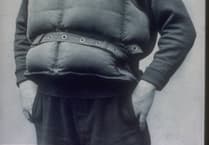Three men received suspended prison sentences at Swansea Crown Court on Monday (September 14), for food related offences which arose from the illegal slaughtering of sheep at Bramble Hall Farm, Ferry Lane Pembroke Dock, on 21st January, 2019.
Sean Burns, John Clayton and Kenneth Darren Evans were discovered by Officers of the Public Protection Department of Pembrokeshire County Council, in the process of preparing sheep carcasses, which had just been slaughtered into ‘smokies’.
Smokies are an illegal product which is created by the singeing of the fleece off the carcass of a sheep, to leave the surface of the meat with a smoky colour and leaving the carcass with a distinct strong smoky smell, as a result of the burning process.
Smokies are products which are sold to specific ethnic communities which view them as a delicacy.
Apart from the filthy conditions in which these products were being processed, and the blatant disregard to any regulatory control over the slaughter of animals and processing them into food, smokies cannot be produced legally, as the skin is left on the carcass of the animal. This is not permissible for sheep meat in the EU.
Sean Burns of Pembroke Dock, pleaded not guilty to five charges:
operating a food establishment without the required approval
operating a slaughterhouse that failed to meet specific legal requirements relating to hygiene
failing to ensure food premises were clean and maintained in good repair
possessing unsafe food for the purpose of sale
failing to collect animal by-products in accordance with legal requirements
Burns was found guilty on all five counts.
For each count, Burns was sentenced to 12 months imprisonment suspended for two years, to run concurrently.
He was also made subject to a Rehabilitation Activity Requirement for five days, and required to pay a victim supplement of £140 within 28 days.
Clayton, of Carmarthen, pleaded guilty to two charges of possessing unsafe food for the purpose of sale and failing to collect animal by-products in accordance with legal requirements.
He denied three charges of operating a food establishment without the required approval, operating a slaughterhouse that failed to meet specific legal requirements relating to hygiene and failing to ensure food premises were clean and maintained in good repair.
Clayton was found guilty on all counts.
To the charges Clayton had denied he was sentenced to 12 months imprisonment suspended for two years.
For the charges to which he pleaded guilty, he was sentenced to nine months imprisonment, suspended for two years, to run concurrently.
Clayton was also made subject to a Curfew for three months between the hours 8pm-8am, required to wear a security tag, made subject to a Rehabilitation Activity Requirement for five days, and required to pay a victim supplement of £140 within 28 days.
Kenneth Darren Evans, also of Carmarthen, admitted two charges of possessing unsafe food for the purpose of sale and failing to collect animal by products in accordance with legal requirements.
Evans was sentenced to 16 weeks imprisonment, suspended for two years, required to undertake 150 hours unpaid work and required to pay a victim supplement of £140 within 28 days.
It should be noted that there is currently Court of Appeal guidance in place which recommends that suspended sentences should be considered in appropriate cases, due to the prevalence/risk of Covid-19 in prisons.
It is recognised that this may have led to more leniency being shown by the Court in this case.
No prosecution costs were awarded to Pembrokeshire County Council.
Speaking after the sentencing, Pembrokeshire County Council’s Cabinet Member for Environment, Public Protection and Welsh Language, Cris Tomos, said the Authority was “extremely pleased” with the verdicts.
Cllr Tomos added: “While it was disappointing that costs had not been awarded in this protracted and lengthy investigation, it was important that these illegal activities are highlighted to illustrate the fact that such offenders have absolute disregard for the health of any potential purchasers, for any of the rules relating to the safety of food or the wellbeing of the animals which they slaughter.”





Comments
This article has no comments yet. Be the first to leave a comment.